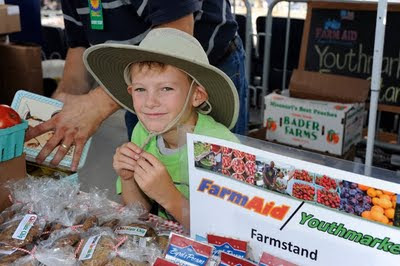 Today, as their t-shirt slogan requested, I asked the Seba family about their blackberry patch. Renee and Charlie started their 2-acre blackberry farm, Mule Barn Berries, in Lathrop, Mo. 2 years ago to get their kids outside more and to teach them the value of hard work and managing money. And Hailey, 12, Regan, 10, Trevor, 8, and Elise, 6, couldn’t be more thrilled. Hailey says, “It’s a really cool learning experience. I could give you a speech off the top of my head about blackberries!”
Today, as their t-shirt slogan requested, I asked the Seba family about their blackberry patch. Renee and Charlie started their 2-acre blackberry farm, Mule Barn Berries, in Lathrop, Mo. 2 years ago to get their kids outside more and to teach them the value of hard work and managing money. And Hailey, 12, Regan, 10, Trevor, 8, and Elise, 6, couldn’t be more thrilled. Hailey says, “It’s a really cool learning experience. I could give you a speech off the top of my head about blackberries!”
The kids worked at the Farm Aid Youthmarket Farm Stand today, selling berries from their farm, roasted corn and apples. The family picked 460 half-pint containers of berries to sell at Farm Aid and at their state fair going on for the next 2 weeks. It took them about 10 hours!
Charlie grew up on a hog farm and Renee has always lived in the country, so moving to town was a big adjustment. Their solution for staying in touch with their roots and getting their kids involved was to plant blackberries in their yard.
Planting the patch was no small feat, but family and friends made it possible. Uncles, grandparents, and neighbors all came to help out while the family got the berry patch up and running. As Hailey put it, her dad and uncles would “trade Saturdays.” They would come over for a few Saturdays to help dig irrigation trenches in the spring, and then after the harvest when they weren’t as busy, Charlie would go to help them out with their projects.
The kids’ grandparents were also prepared to help. After 6 weeks of heavy harvest, the laundry really starts to pile up! “Grandma came to set it straight,” Regan said. “She did laundry for 4 days!” Elise said, “I was there, and it was a mess!”
With only a few weeks left of berry-picking, the Seba family has almost made it through their first growing season. And reflecting back on their first harvest, Renee says “We’ve experienced it. All hands on deck. Seriously.”
Renee says that their goal on the farm is sustainability, and they want to be profitable while preserving the land. They use as little pesticides and herbicides as possible. The family weeds the two miles of blackberry bushes by hand, and this year they only sprayed to prevent an influx of stinkbugs from destroying the crop.
The family has mapped out a 10-year plan for their farm, which they hope will eventually include a hillside of raspberry plants and a building for storage and selling. Renee says that operating the farm is still a little overwhelming, but she’s very happy with the positive impact it has had on the kids. And the influence of their farm has already started to spread. A neighbor bought two rows of blackberry plants from the family, and is raising them to get an early start on his high school project for Future Farmers of America (FFA).
Despite all of the good that has come out of starting their farm, the Seba’s face the same challenges as so many other farmers. This year, they planted sweet corn, peppers and tomatoes in addition to blackberries. The additional crops didn’t fare very well because they were affected by the after-spray from a surrounding 6,000-acre corn farm. “We’re scared whenever the over-sprayer goes by,” says Renee. “The blackberries are very sensitive to pesticides and herbicides.”
The Sebas’ farm is located in historical Clinton County, which was a mule capital in the 20th century and was once home to the largest barn in the world. During World War I, soldiers got mules from the barn, and watered the animals at the 60-acre lake that was built nearby.
Renee says she hopes that the farm will teach the kids about hard work, as there are not a lot of opportunities for summer jobs in their area. She also hopes the farm will eventually provide a second income for their household. But overall she says that even if they never make much money, they’ve seen such a change in the kids—-they’ve gained self-confidence, learned to interact with people and gained experience managing money. “We’re very pleased,” she says, “We’re already very pleased.”
And she has every reason to be pleased. The kids are some of the most polite and well spoken I’ve ever met, and they have nothing but good things to say about being young farmers. Trevor says, “We’ve learned a lot. And it’s a lot of hard work!” And Regan adds, “It also shows us you can start a small business by yourself. You can!” Perhaps we’ve got some farm advocates of the future on our hands!


